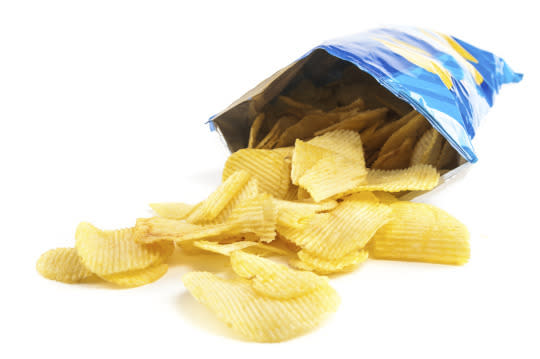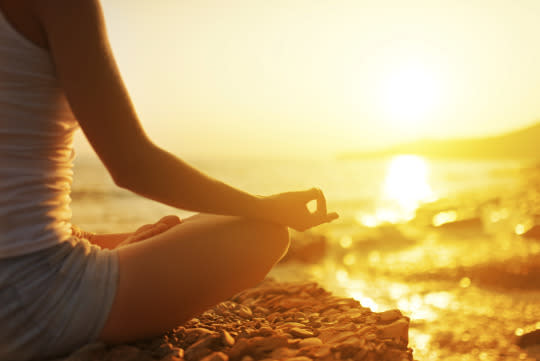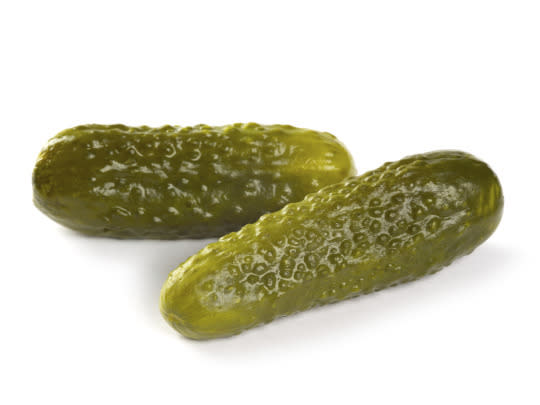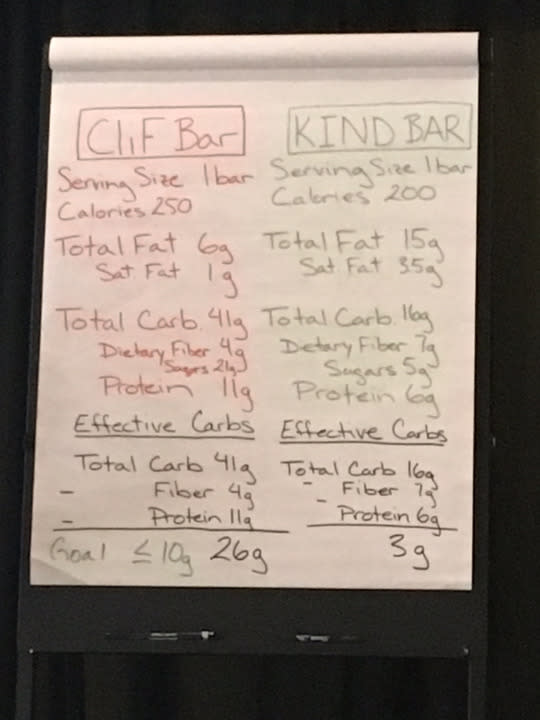22 Things I Learned at the Biggest Loser Resort
Sometimes you go on vacation to lie on the beach and drink piña coladas, and sometimes you go on vacation to better your mind and body. Recently, I spent a week at the Biggest Loser Resort in Palm Desert, Calif., to learn how to eat right and work out. Though it wasn’t easy (I spent four hours a day working out and another three in nutrition and wellness classes), I certainly learned a lot. Here are some of the best and most surprising tidbits I picked up along the way. It’s the getaway that keeps on giving!
1. There is an easy formula to find out the number of calories you need to eat to lose weight (and you can eat more than you think)

Here’s how to control the scale. (Photo: Thinkstock)
Weight loss is partially about math. According to the Biggest Loser Resort Palm Desert nutritionist Regina Basterrechea, studies show that the ideal number of calories you should eat to lose weight is your basal metabolic rate plus 200. (Your BMR is the number of calories you burn at rest for 24 hours — in other words, the amount of calories your body uses to perform all its basic functions.) It’s ideal to have your BMR assessed via a machine administered by professionals (like at your gym, for example), but you can figure out your approximate BMR here. If you are active, you can have a few extra calories: For the moderately active, multiply your BMR by 1.55 and subtract 200 from that number to get your daily calories for weight loss; for the very active, multiply by 1.725 and subtract 200; and for the extremely active, multiply by 1.9 and then subtract 200. Chances are, this number may be higher than you think. For example, in my mind, I needed to eat about 1,100 calories a day to lose weight. But in reality, my BMR was 1,431, which meant I could eat 1,631 calories a day and still drop pounds (and even more when I worked out).
Related: Experts Tell How to Get the Most Happiness Out of Your Next Vacation
2. Many grocery stores will cook a healthy protein for you

Photo: Thinkstock
If one of the roadblocks stopping you from eating healthy is your inability to cook, there is help. Fish is a healthy protein, and many grocery stores will cook it for you for free. For example, many Whole Foods locations will season and steam any type of seafood you buy and send it home ready to eat — all at no charge. Customers can even pick from different spice blends like Latin, Cajun, and Asian. Just ask your local store whether the service is available.
3. It takes 66 days to form a habit
The conventional wisdom used to be that it takes 21 days to form a habit, but the truth is it takes an average of 66 days — and that goes for healthy habits too. But if you take those 66 days one at a time and make sure your changes are small enough to be sustainable, a new lifestyle will take root. Think about it this way: Those 66 days are going to pass whether you’re walking four times a week or eating a healthy breakfast or not. So you might as well make them count.
4. Your body is capable of working out a lot — more than you think — even if you’re totally out of shape
Sometimes it seems overwhelming to start getting in shape. But no matter where you are on the fit scale, you can do more than you think. Of course, it’s always smart to check with your doctor before starting a workout program, but at the Biggest Loser Resort, everyone works out for four hours a day — no excuses. Whether the participants are 20 or 70, ripped or needing to lose 100 pounds, they all do their four (or more!) hours. The key is going at your own pace. Almost everyone can find something they’re able to do, whether it’s walking, bicycling, or swimming. So stop letting your mental block be your biggest obstacle.
5. Not all calories are created equal

Photo: Thinkstock
While we would all like to live in a world where our bodies are just as happy with 300 calories’ worth of potato chips or Pinkberry as with 300 calories’ worth of free-range chicken breast or broccoli (that is, if you could actually eat 10 cups of broccoli), that is just not reality. The truth is, food is not only energy, but also information, so quality matters, according to the Biggest Loser program. Everything you eat has to be processed by the body, and in that respect, your body treats whole foods differently than chemicals. Basically, when you eat natural, whole foods, your body knows how to utilize them. But if you eat too many processed foods, artificial ingredients, and chemicals, your body doesn’t recognize them as natural and is not quite sure what to do with them. Therefore, it sends these foreign substances to detoxing organs like your liver and kidneys, which can end up taxing and overloading them.
6. Coconut oil really is legit
Not only is coconut oil really healthy for you, but it can also help you burn more fat and eat fewer calories. Plus, it has antibacterial and antifungal properties, and you can use it for everything — from a cooking oil to a condiment (in place of butter) to a moisturizer and more. Red palm oil is another winner.
Related: We Found the Next Superfood in Israel
7. It’s true that your body probably doesn’t like dairy and gluten — as annoying as that is
I know, I know: If you hear about gluten-free foods one more time, you’re going to scream. I felt the same way — until I cut gluten out of my diet. At the Biggest Loser Resort, the meal plan is both low-dairy and nearly gluten-free. The whole time I was there, I was totally skeptical about sensitivity to these things. Then I went home and began to eat them again. My digestion rebelled big time, with crazy bloating, nausea, and reflux. The truth is, these things may be causing hidden inflammation in your body too. Luckily, it’s pretty easy to get things like gluten-free breads and pasta, and lots of your fave carbs, like potatoes and rice, don’t contain gluten. (Fun fact: According to Biggest Loser Resort nutritionist Basterrechea, people of Eastern European descent and Ashkenazi Jews are prone to gluten intolerance.) Admittedly, dairy is a little harder, and it depends on which part of dairy you’re sensitive to (casein, lactose, or whey). But some dairy-sensitive people can tolerate dairy from goats (as opposed to cows) or fermented dairy, like yogurt or kefir. And cutting back instead of totally eliminating can be helpful for others. It’s about trial and error.
8. Not only is breakfast super-important, but you also need to eat it at the right time
Eat your breakfast within 45 minutes to an hour of waking up. It gets your metabolism going and helps you burn calories.
9. Relaxation is just as important as working out

Photo: Thinkstock
According to Kathy Orlando, fitness director at the Biggest Loser Resort Palm Desert, resting and rebuilding should be part of any wellness plan, for both physical and mental health.
Related: 5 Stress-Busting Exercises You Can Do Absolutely Anywhere
11. You can and should eat carbs and fat — you just want to eat them with protein
Carbs and fat have gotten a bad rap over the last few years, but your body needs them to function. For example, carbohydrates are your body’s preferred source of energy, according to the Biggest Loser Resort program, and your brain needs at least 120 grams of good carbs (like starchy veggies, unprocessed whole grains, beans, and fruit) to function. Best of all, eating the right amount of healthy carbs will help your body avoid fat storage. As for healthy fats (i.e., unsaturated fats), they give you a consistent level of energy, supply essential fatty acids (which your body can’t make itself), and help in the absorption of important fat-soluble vitamins, according to the Biggest Loser Resort program. Plus, they help make you feel satisfied after eating, so you won’t feel hungry an hour later. The trick is to eat these things together. That’s because protein takes longer to digest, so it helps slow the digestion of carbs (so it doesn’t spike your blood sugar) and helps you feel fuller (so you don’t eat too many carbs or too much fat).
12. In fact, eating enough protein with all meals and snacks is one of the best things you can do to lose weight
Eating a diet with enough protein (3 to 6 ounces at every meal and 1 to 2 ounces for snacks) actually helps you burn fat. Studies have shown that a protein-rich diet can boost your metabolism up to 100 calories a day and can make you eat less (as many as 441 fewer calories a day) because protein takes longer to digest and makes you feel fuller longer.
13. Eating off a smaller plate really does make you eat less
When you fill your plate, it looks and feels as if you’re eating more, leaving you satisfied. It really works.
14. Not getting enough sleep can make you fat
The connection between lack of sleep and obesity is pretty strong, and experts think it’s because it messes with your hormones. Ideally, you should get between seven and nine hours of good sleep a night.
15. If you work out a lot, you should eat pickles

Photo: Thinkstock
It’s strange, but, according to Basterrechea, the salt in pickles helps you stay hydrated, and sodium is one of the electrolytes you lose most quickly if you’re working out a lot.
16. Poor digestion causes more problems than you know
Forget gas, bloating, and indigestion. According to Basterrechea, something called leaky gut syndrome can cause issues ranging from weight gain to autoimmune diseases like rheumatoid arthritis and psoriasis to asthma, rosacea, and depression. Cutting processed and inflammatory foods from your diet can help. And check with your doctor about taking probiotics or digestive enzymes to help return your system to balance.
17. Vitamin D is a totally underrated vitamin
Your body can only make vitamin D with sufficient sun exposure (hence its nickname, “the sunshine vitamin”), yet it’s vital to your health. Since you can make little to no vitamin D at latitudes above 37 degrees north (the latitude stretching approximately from San Francisco to Richmond, Va.) except for in the summer months, and because sunscreen blocks vitamin D production, many people are deficient. It’s also hard to get vitamin D from foods, so look into taking a supplement. Adequate levels of vitamin D are essential for your health, and there is some evidence the vitamin can help you burn fat.
18. There are three things you should look for in a personal trainer
According to fitness guru Orlando, a personal trainer should really be a fitness mentor — someone who fits your style and personality, is accountable, and has been around the block.
19. There’s easy nutrition math you can do to compare foods at the supermarket

Comparing a Clif Bar with a Kind Bar. (Photo: Leah Ginsberg)
Basically, when finding products to buy and eat, you’ll want to calculate that they have the best balance of protein and “effective carbs” by looking at the carbs, fiber, and protein. Take the total grams of carbs and subtract the grams of fiber and protein. The resulting number is the “effective carbs,” which you’d ideally like to keep below 10.
20. The best workouts combine cardio and resistance training — and you need to mix it up
If you’re only doing the same old elliptical workout, not only is your body adjusting to the routine (therefore giving you less benefit over time), but a lack of strength training could also cause you to start burning muscle rather than fat. Plus, muscle burns more calories than fat, so you want more muscle!
21. There’s a trick to stop burping up fish oil supplements
Try this tip from Basterrechea: Freeze your fish oil supplement. That way the capsule won’t dissolve until it’s further down your digestive track, so there’s less of an opportunity for it to repeat on you.
22. By lunch, you should have eaten half of your calories for the day
It’s a good digestive and healthy rule of thumb to live by.
WATCH: Before and After: These People Lost Tons of Weight at Fitness Resorts
Let Yahoo Travel inspire you every day. Hang out with us on Facebook, Twitter, Instagram, and Pinterest. Check out our original adventure travel series “A Broad Abroad.”
For more on Yahoo Travel’s travel policy, click here.
